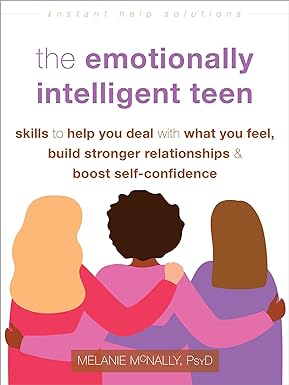
This is a contributed post by Dr. Melanie McNally, author of The Emotionally Intelligent Teen
Emotions can be hard for teens to handle, especially when they are intense or feel out of control. Many parents struggle to help their teen handle hard feelings and even with the best intentions, end up making things worse. As a clinical psychologist and brain coach who works with teens, I see how tricky this area can be for a parent to navigate. It often goes something like this: teen expresses frustration or worry over something in their life, parent offers advice and solutions, teen becomes even more frustrated, parent becomes hurt or annoyed, parent and teen argue, teen storms out even more upset than they were to begin with, and parent throws their hands up in the air and wonders what just happened. Sound familiar?
The parents and teens I work with want a better way. They want to learn how to express their feelings in healthy ways and to have coping tools to deal with the difficult ones. Parents want to see their teens stretch their comfort zones and to feel capable while doing so. And teens want to participate in life and feel good about the choices they’re making.
When Emotions Control Your Teen
When teens don’t know how or are unable to manage their emotions, small obstacles become huge barriers. They’re stopped in their tracks and can’t move forward. They end up quitting the team or skipping auditions. They talk themselves out of approaching their crush or pretend they’re sick so they don’t have to play in the game. They’ve allowed their negative feelings to take control and now they’ve missed out on something important to them. They feel guilt, shame, and sadness about their choices and then blow up at you when you ask what went wrong.
Anxiety tends to be a big one when it comes to losing control. Oftentimes, teens don’t realize they’re anxious or see just how much the anxiety is holding them back. They end up missing out on great opportunities because they haven’t yet learned how to recognize or manage these feelings. I’ve listened to countless teens justify how their anxious thoughts are 100% correct and list out the reasons why they can’t do the thing they truly want to be doing. But I also have helped these teens realize how inaccurate these thoughts can be and watched them do the thing they want, even while feeling uncomfortable.
Related: Seven Strategies for Helping Your Teen Cope with Test Anxiety
How Emotions Impact Your Teen
Researchers found that the stronger an individual feels an emotion in their body, the stronger it is in their mind. Let’s consider how this might look for your teen who might struggle with the anticipation of tasks. Maybe they get nervous about public speaking and know they’ll have to share their perspective during an upcoming speech in English class today, otherwise they’ll miss out on major participation points. They have an upset stomach all morning as they wait for class, which they interpret as a bit of nervousness. By the time they sit in their desk, their stomach is churning, they feel hot, and have a lump in their throat. Because these physical sensations are so strong, they tell themselves they must be extremely anxious for the discussion, even though they were mildly nervous earlier.
How your teen interprets their physical sensations also has an impact on how intense those emotions become. When your teen interprets the upset stomach as nervousness, they’ll likely increase the intensity of the feeling. However, if they interpret the upset stomach as a normal response to a stressful situation, it might not feel as scary. And the same goes for how they interpret their emotions as well. When your teen thinks of nervousness as a normal emotion that comes and goes, they’re more likely to just let it pass through. In contrast, when they view underlying anxiety as a sign that something is wrong or that the feeling needs to be avoided at all costs, they’ve just made the emotion even stronger.
Reframing Emotions
Reframing means thinking of something in a different way or changing our mindset so that we view it in a more helpful way. When we reframe a situation, for example, we’re finding another way to look at it. Perhaps you’ve had the experience of thinking you’d made a fool of yourself in a work meeting, but then your colleague mentions how nice it was to hear your thoughts for a change. You find yourself feeling proud for speaking up instead of embarrassed for stammering. You just reframed your mindset on the situation, making it much more likely that you’ll speak up again.
We can also reframe our emotions. Instead of thinking of them as something that control us or that dictate our behavior, we can view them normal responses to stressful situations. The feelings are still there, but the only difference is that we’re the boss and we see them for what they are. Strong emotions like anxiety, stress, or fear don’t have to mean there’s something wrong with us, the situation, or others, they’re simply the way our brain and body are responding currently.
Parents can model this tool by talking through their own process of doing this and then asking questions to get their teen thinking of their own experiences. Maybe you’re feeling stressed about a difficult conversation you need to have with a relative. While driving your teen to their friend’s house, you could say, “You know how I’ve been saying your grandmother needs to respect our boundaries better and can’t just show up unannounced? I’m feeling anxious about talking to her about this tonight, but know this feeling is normal. It just means I’m going outside my comfort zone and doing something hard. It’s actually kind of a good thing. I guess if I wasn’t anxious about it, I probably wouldn’t take it seriously or even take action. Does that ever happen to you? Where you feel anxious about something but know it’s a sign that you’re on the right track?”
Related: It Broke My Heart to See My Son Suffer with Social Anxiety–Here Is How to Help
Turn Anxiety into Excitement
My absolute favorite emotion to reframe is anxiety. The reason? Because it’s so easy! Anxiety usually comes with physical symptoms of shortness of breath, feeling hot or flushed, jitteriness, and stomach butterflies. Guess what other emotion shares these same physical sensations? Yep, excitement. Because they share these sensations, we can get our brains to interpret them as excitement rather than anxiety. And when we do that, our mindset completely shifts as well. We’re no longer thinking of all the ways the experience could go wrong, like we do when we’re anxious. Instead, we’re focused on what’s fun about the situation.
Here’s how to do it:
- Notice the physical sensations as an observer. Rather than saying “I’m shaking” or “I’m so hot,” we say “My body feels jittery” or “I can feel heat in my body.” Sounds small but this slight shift in language creates a gap between our body and our brains, which is exactly what we want.
- Label them as excitement. By saying aloud “I’m so excited!” a few times, we’re convincing our brains that we truly are and that it should interpret these sensations as excitement rather than fear or anxiety.
- Focus on what’s exciting about the situation. Put your attention on the things that make the situation good like how amazing it is to even get the job interview or how incredible you’ll look on stage in your new outfit.
Reframing our emotions is a useful tool to teach teens. Model it by practicing this type of positive self-talk yourself and discuss with your teen the changes you notice from doing it. Teach your teen how to reframe anxiety as excitement by sharing this article with them and encouraging them to practice doing it when it feels more manageable. Instead of waiting to try it out before taking the stage in front of the entire school, they can practice it during class presentations or when approaching a new friend group. And the more they practice it, the easier it gets. Soon, they’ll feel more in control of hard feelings and ready to handle adversity.
For more resources on helping teens strengthen their emotional intelligence, check out Dr. Melanie McNally’s book The Emotionally Intelligent Teen: Skills to Help You Deal with What You Feel, Build Stronger Relationships, and Boost Self-Confidence.

Parenting teens and tweens is hard, but you don’t have to do it alone. Here are some other posts parents found helpful.
Use This Question to Help Your Teen Grow Through Hard Times
10 Must-Listen To Podcasts for Parents of Teens
4 Healthy Ways to Support Your Teens When They’re Upset
Mental Health Issues Stopped My Son From Graduating High School On Time
*This post may contain affiliate links where we earn a small commission for items you purchase from our partners.






972haa
gyq12h
y9jsbm
ip0trl
yzlbyg
c2u2ur
7bvs2h
cfo3s2
83wuxu
eul2ba
8dksl2
0mal7i
ocnxpm
fpw4a4
1q6eps
j2ed4l
2stgbu
7h7cvy
1k0oaj
oz4mbx
2xjgch
nxhw0m
syk5oo
3k6tg8
v6jxjc
fkhwld
r1psr1
4znbdh
4xd91v
sve5ae
hspv5s
bwv85m
pzbuzf
s55qf0
zmnfxs
oyhufj
mnwd0c
ilza2f
qx6vql
u6ptiz
qxfyld
o6q3ua
9ciawh
numdq2
nmmypi